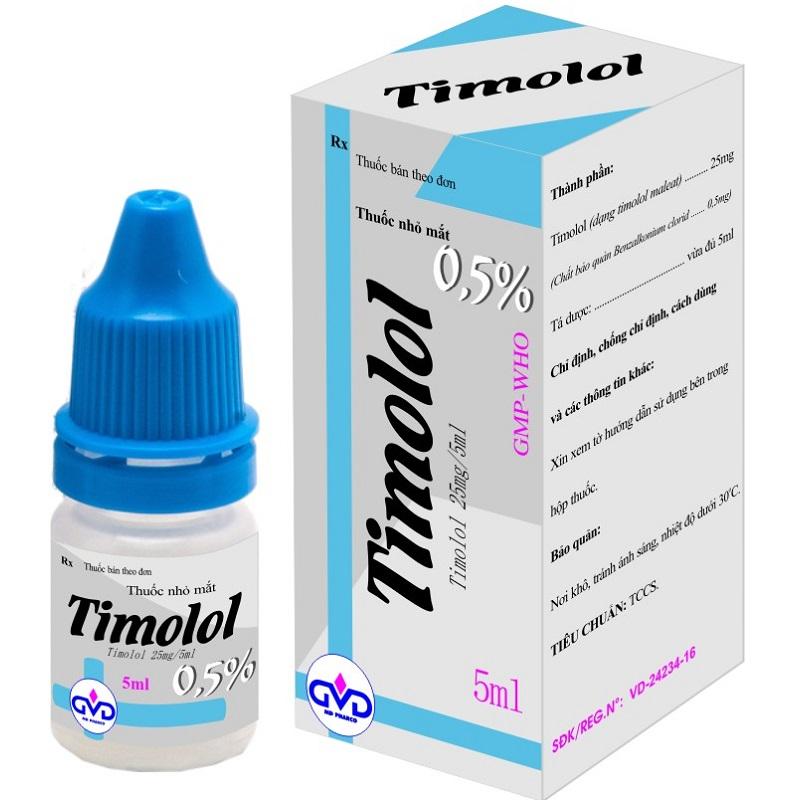Function
What is the effect of timolol?
Timolol is used with or without other drugs to treat hypertension. Lowering high blood pressure helps prevent stroke, heart attack and kidney problems. Timolol is also used after a heart attack to help prevent another heart attack.
Timolol belongs to the beta blockers group, which works by blocking the action of certain natural substances in the body such as epinephrine on the heart and blood vessels. This effect reduces the heart rate, blood pressure, and heart pressure.
Timolol is also used to prevent migraines and prevent chest pain (chronic stable angina).
How should you use timolol?
Take with or without food, usually once or twice a day or as directed by your doctor.
Dosage is based on health status and response to treatment. To treat hypertension, do not take more than 60 mg a day. To prevent migraines, do not take more than 30 mg a day.
Take medication regularly to get the best results. To help you remember, take medication at the same time every day.
For treatment of hypertension, it may take several weeks for the drug to develop its full potential. Continue to take medication even when you feel better. Most people with hypertension do not feel sick.
To prevent chest pain or migraines, take regular medication as directed.
This medicine should not be used to treat chest pain or migraines when these conditions occur. Use other drugs to relieve angina and sudden migraine as directed by your doctor (for example: head). Consult your doctor or pharmacist for details.
Tell your doctor if your condition is not improving or deteriorating (for example, if your blood pressure level is high or increasing if your angina or migraine occurs more frequently). .
How should you preserve timolol?
Store at room temperature, avoid moisture, protect from light. Do not store in the bathroom. Do not store in the freezer. Each drug may have different preservatives. Read the packaging instructions carefully, or ask your pharmacist. Keep medicines out of the reach of children and pets.
Do not throw the medicine in the toilet or plumbing unless required. Dispose of properly when the drug is expired or unusable. Consult your local pharmacist or local waste disposal company for safe disposal.
Dosage
The information provided can not substitute for the advice of the medical professional. Always consult your doctor or pharmacist before making any decisions.
How is timolol administered to adults?
The usual dose for adults with hypertension:
Starting dose: 10 mg twice a day.
Maintenance dose: 10-20 mg twice a day.
The usual dose for adults with angina:
Starting dose: 10 mg twice a day.
Maintenance dose: 10-20 mg twice a day.
The usual dose for adults with myocardial infarction:
Starting dose: 10 mg twice a day.
Normal dosage for adults to prevent migraine:
Starting dose: 10 mg twice a day.
Maintenance dose: 10-30 mg divided into 1-2 doses.
How is timolol administered to children?
Dosage for children has not been studied and decided. Ask your doctor if you plan to use this medicine for your baby.
What are the forms and levels of timolol?
Timolol has the following form and content:
Tablets 5 mg, 15 mg, 20 mg;
(AHFS Drug Information Essentials).
Side effects
What side effects can you have with Timolol?
Get emergency medical help if you have any signs of allergy: rash; shortness of breath; swollen face, lips, tongue, or throat.
Call your doctor right away if you have any of the following serious side effects:
Slow or uneven heart rate;
Delirium, fainting;
Feeling short, even exertion;
Swelling of the ankle or foot;
Nausea, abdominal pain, mild fever, anorexia, dark urine, clot color, jaundice (yellowing of the skin or eyes);
Depression;
Cold feeling in hands and feet.
Other less serious side effects are more likely to occur, such as:
Decreased sexual desire, impotence, or difficulty in achieving orgasm;
Sleep problems (insomnia);
Feeling tired;
Anxiety, restlessness
Not all of these side effects are present. There may be other side effects not mentioned. If you have any questions about side effects, consult your doctor or pharmacist.
Caution / Warning
Before using timolol what should you know?
When taking this medication, weigh the benefits and risks that it brings. This depends on your decision and the doctor. For this drug, the following should be considered:
Allergy
Tell your doctor if you have ever had any unusual reactions or allergies to this medicine or any other medicines. Talk to your doctor if you have any other allergies, such as food allergies, dyes, preservatives, or animals. For non-prescription products, read labels or ingredients on the package carefully.
Children
Appropriate studies have not been conducted on the association between age and cardiovascular effects on pediatric subjects. Safety and effectiveness have not been proven.
Elderly
Appropriate studies have so far failed to demonstrate specific problems in the elderly that limit the benefits of timolol in the elderly population. However, older patients are more likely to have age-related problems such as liver, kidney, heart function. Therefore, dose adjustment should be made in these patients.
Things to keep in mind if you are pregnant or breastfeeding
There are no adequate studies to determine the risk of this drug during pregnancy or lactation. Before taking medicine, always consult your doctor to weigh the benefits and risks. This drug belongs to group C for pregnancy, according to the US Food and Drug Administration (FDA).
Note: Pregnancy Category:
A = no risk;
B = No risk in some studies;
C = Possible risk;
D = evidence of risk;
X = contraindications;
N = Not yet known.
Drug interactions
What can Timolol interact with?
Drug interactions can alter the ability of the drug or increase the effect of side effects. This document does not cover all possible drug interactions. Write a list of what you are taking (including prescription and over-the-counter medications) and your doctor or pharmacist. Do not take medication, discontinue or change the dose without permission of the physician.
This medication is not recommended for any of the following medications, but may be needed in some cases. If both drugs are prescribed together, your doctor may change the dose or frequency of use of one or both drugs.
Albuterol;
Arformoterol;
Bambuterol;
Clenbuterol;
Colterol;
Crizotinib;
Dronedarone;
Fenoldopam;
Fenoterol;
Fingolimod;
Fluoxetine;
Formoterol;
Hexoprenaline;
Indacaterol;
Isoetharine;
Lacosamide;
Levalbuterol;
Metaproterenol;
Olodaterol;
Pirbuterol;
Procaterol;
Reproterol;
Ritodrine;
Rivastigmine;
Salmeterol;
Terbutaline;
Tretoquinol;
Tulobuterol;
Vilanterol.
Taking this medication with any of the following medications may increase the risk of certain side effects, but using both may be the best treatment for you. If both drugs are prescribed together, your doctor may change the dose or frequency of use of one or both drugs.
Aceclofenac;
Acemetacin;
Ametolmetin guacil;
Aspirin;
Bromophenac;
Bufexamac;
Celecoxib;
Choline salicylate;
Clonix;
Dexibuprofen;
Dexketoprofen;
Diclofenac;
Diflunisal;
Dipyrone;
Etodolac;
Etofenamate;
Etoricoxib;
Felbinac;
Fenoprofen;
Fepradinol;
Feprazone;
Floctafenine;
Flufenamic acid;
Flurbiprofen;
Ibuprofen;
Ibuprofen lysine;
Indomethacin;
Ketoprofen;
Ketorolac;
Lornoxicam;
Loxoprofen;
Lumiracoxib;
Methylphenamate;
Mefenamic acid;
Meloxicam;
Morniflumate;
Nabumetone;
Naproxen;
Nepafenac;
Niflumic acid;
Nimesulide;
Oxaprozin;
Oxyphenbutazone;
Parecoxib;
Phenylbutazone;
Piketoprofen;
Piroxicam;
Pranoprofen;
Proglumetacin;
Propyphenazone;
Proquazone;
Rofecoxib
Salicylic acid;
Salsalate;
Sodium salicylate;
St. John's Wort;
Sulindac;
Tenoxicam;
Thiaprofenic acid;
Tolfenamic acid;
Tolmetin;
Valdecoxib.
Does food and alcohol interact with timolol?
Certain drugs should not be taken at meals or at the same time as certain foods because of possible interactions. Alcohol and cigarettes can also interact with certain drugs. Consult your health professional about taking medication along with food, alcohol and tobacco.
What health conditions affect timolol?
Your health status may affect the use of this medication. Tell your doctor if you have any health problems, especially:
Angina pectoris - can cause chest pain when stop taking medication abruptly;
Asthma;
Slow heart rate;
Chronic Obstructive Pulmonary Disease (COPD);
Stop the heart;
Heart failure - should not be used in patients with this condition;
Vascular disease (especially cerebrovascular disease);
Have a history of stroke - use caution as medicine can worsen this condition;
Diabetes;
Hyperthyroidism (overactive thyroid gland);
Hypoglycemia (low blood sugar);
Severe kidney disease;
Liver disease - the effects can be increased by delayed release of the body;
Lung disease (such as bronchitis, emphysema) - can cause shortness of breath in patients with this condition;
Myth - This can worsen the condition, such as weakness.
Emergency / Overdose
What should you do in an emergency or overdose?
In an emergency or overdose, call the nearest emergency center 115 or go to the nearest local health unit.
What should I do if I forget a dose?
If you forget to take a dose, use as soon as possible. If, however, close to the next dose, skip the missed dose and take the next dose at the scheduled time. Do not double the prescribed dose.




